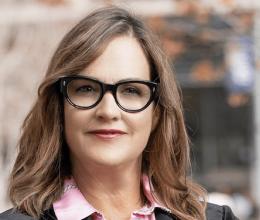
Professor Kellie McElhaney, Founding Director of the Center for Impact Leadership at the Haas School of Business, met with us to talk about her leadership story.
As a female leader, what has been the biggest barrier in your career?
In general, I think my most significant barrier is having internalized all the negative "too" messaging that was directed at me from a gendered perspective: "you're too bold, too emotional, too direct, too forceful" and made this a story that was told to me, instead of writing and telling my own story. I learned that being authentic is to "author" my own story. If I had done this twenty years earlier, I would have had 20 times the impact I am able to be now as my authentic self.
What traits do great leaders possess?
The two traits that I believe the greatest leaders possess are vulnerability and curiosity. Being brave enough to show vulnerability in sharing parts of your inner self—such as a difficult experience you have overcome, a non-visible challenge you may struggle with every day, or feelings of fear and insecurity.
The power comes in your ability to connect with others on a human level. Their sense of safety will increase, and they will work harder for you and have a deeper sense of commitment. Maya Angelou—one of my most admired leaders—said that “as a leader they will not remember what you said or what you did; they will only remember how you made them feel.”
Curiosity is asking “why?” Asking others to share their lived experiences with you. And really listening to other people's stories. I once heard Jenny Simon O'Neill, our Cal Associate Athletic Director, say: "always be an intern".
How can women shape the future culture in business?
To truly shape future culture, I think women need to do three things:
- For every rung that she climbs, she must reach down and lift two women with her—and be consciously inclusive. We tend to lift those who look the most like us. So I say be sure that for every woman you lift who looks like you, lift one who does not look like you.
- Most of all, we must celebrate other women and their accomplishments every single day. I just did this in passing on some great feedback I heard about a colleague from one of her mentees. My colleague said she could not wait to show my email to her wife and said it absolutely made their weekend.
- And last but not least, we must actively recruit sponsors and allies in men.
Professor McElhaney curated a custom program for Saudi women leaders with the King Abdullah University of Science and Technology (KAUST).
What was the goal of the Women's Leadership program at the King Abdullah University of Science and Technology?
Saudi has never before had so many opportunities for women to advance into positions of leadership. The landscape for women in the Kingdom has shifted tremendously since we began teaching there in 2014. The custom program for KAUST supports King Salman Bin Abdulaziz Al-Saud's Vision 2030 in educating a new era of women in leadership positions throughout the country and increasing not only the representation of women in leadership but also women's success as leaders.
What challenges did the King Abdullah University of Science and Technology face in regards to gender and culture?
While KAUST was started at the behest of King Abdullah as a model of the future—the first and still only co-gender global graduate research institution in the country—all eyes continue to watch intently. In many ways, KAUST led the way for cultural attitudinal change as well as the changes in law to grant more and more freedoms to women. They did this by setting bold goals from the outset: be the first university to offer doctoral programs for women; develop a pipeline by offering science training to high school girls for the first time; and reach out beyond the campus to offer skills to women in the broader community such as financial literacy, career development, and leadership training.
What are some outcomes that you saw after the the program?
I always describe the program as watching a rose garden bloom. The women come in not knowing one another and not having had much in the area of formal leadership training, so there is a certain amount of trepidation. By day two, I see a room full of buds, and by day six, there is an explosion of camaraderie, energy, largesse, powerfulness, bold goals, and a deep network not only of professional women across the Kingdom, but friends. It truly is one of the most beautiful teaching experiences I have ever had.
I was just back in Saudi for a day of teaching this month. One of the women came to me and said she was a participant in 2014, and not a day goes by where she does not think about and use the learning, strategies, tools, and mostly the stories she learned in our program. She is now the highest-ranking female to ever lead at her medical school.
Dive Deeper
Take a deep-dive into this topic and gain expert, working knowledge by joining us for the program that inspired it!
The Berkeley Executive Leadership Program
Advance your leadership qualities, build skills to strategically address business challenges head-on, and apply strategic decision-making.
Learn moreWomen's Executive Leadership Program
Understand women's perspectives and strengths in business to improve your problem-solving skills, negotiation tactics, and leadership.
Learn moreLeading Strategy Execution through Culture Program
Learn how to manage change and innovation in your company while implementing a business culture that drives strategic goals.
Learn more


